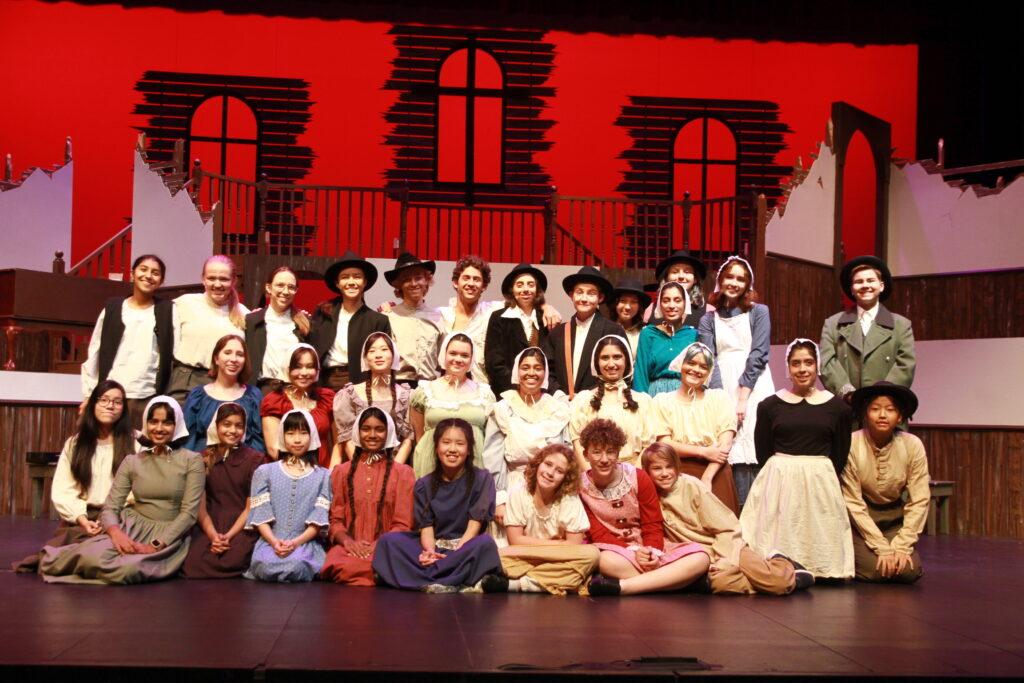During the fall play, “The Crucible,” playgoers experienced a strange sight for a high school production: Eight actors, none with speaking lines, stood out in the cast by sheer virtue of their diminutive stature. These eight actors were, in fact, middle schoolers who took part in a new pilot program by the school’s drama department intended to provide more drama experience to middle schoolers and encourage them to continue theater in high school, a practice that will continue in the spring musical “Mama Mia.”
Since the beginning of the pandemic, the drama department has struggled with low enrollment, primarily due to the face-to-face nature of drama that the pandemic interrupted.
“When you have a performing art that is all about being with each other, not many people liked the Zoom plays — that just wasn’t very popular, and it was hard to get a good theater education,” Brotzman said. “People just wanted to be together, and we didn’t allow them to be [due to COVID-19].”
However, as the school returned to in-personal learning, the numbers show signs of improvement. The program had 68 students in the 2018-19 school year, 60 students in the 2019-20 school year, 28 students in the 2020-21 fully online school year, 53 students in the 2021-22 school year and 45 students in the 2022-23 school year.
As pandemic restrictions loosened, more students also returned to participate in extracurricular plays and musicals, which are separate from the drama program, though many participate in both.
This year, for example, over 36 students participated in the fall play, which was higher than the 25 in last year’s fall play. Despite the generally lower enrollment in the past few years, Brotzman said it didn’t have a “serious impact” on the types of shows the students performed as they were able to fill all of their roles.
To increase interest in the program, Brotzman and the drama program have been working with Redwood Middle School to teach drama workshops, inviting the middle school musical students to the school to provide opportunities to work backstage at the McAfee Center. They are also planning for electives night to show off the program for prospective students.
Brotzman said that during auditions for the two recent student-led plays, he was pleasantly surprised to see new faces auditioning, and he stressed that students do not need prior experience to participate in plays and musicals or enroll in drama classes.
Last year, the school also only had one drama class that combined every level, while this year, they had enough students to split into an introductory class and a more advanced class, combining the higher drama levels.
Despite these numbers rebounding, Brotzman attributed the lower numbers in the program to two main reasons: a precipitous drop in drama participation from middle school to high school and an increase in elective opportunities at the school that has taken place even as overall school enrollment has fallen in the past few years.
Though the middle school does not have an official drama program, it has high enrollment in its yearly musical, sometimes as high as 60 to 80 students, Brotzman said.
“We don’t see those kinds of numbers coming from the freshman class to be either part of the class or the plays and musicals,” Brotzman said. “I don’t know if it’s the high school atmosphere and parents pushing their students to work toward college, or if it’s all the options opening up when they get to high school.”
While the growing popularity of new electives in subjects like engineering and computer science has been a small impediment for the Drama program, Brotzman rejoices at the new, different electives students can take. He sees every elective as an equally important opportunity toward student growth. As such, the program helps work with students who may have other commitments if they should choose to participate in plays or musicals, such as instituting a weekly Friday practice so that even if students cannot go to other rehearsals, they can at least show up once per week and have the opportunity to work with their fellow crew members.
The program has also been expanding through collaborations with classes, such as by working with English teacher Amy Keys’ creative writing class to promote playwriting and the New Work Festival, a series of 6 to 12-minute student-written and directed plays. The festival started with seven plays last year and is continuing this year.
“All we can do really with a slight decline in enrollment is that we can continue to do good work and provide lots of great opportunities and provide a comfortable space that people want to be in,” Brotzman said. “The people who really want to do theater all the time, they need their home. They need their place.”


























